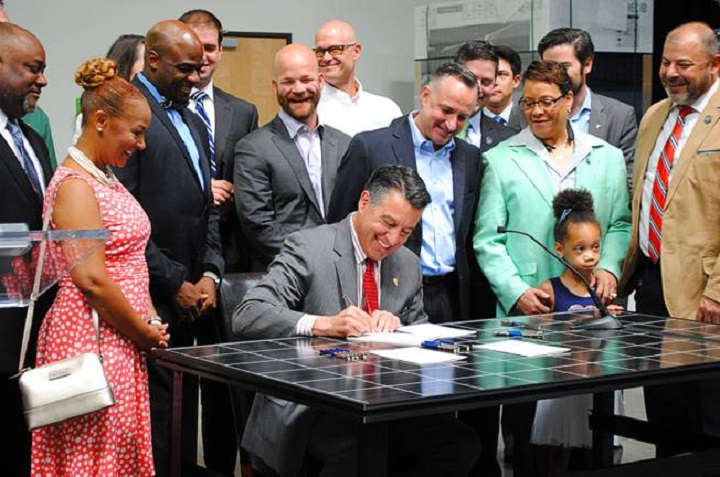In an unlikely scene, Republican Governor Brian Sandoval sat before a crowd of solar advocates, environmentalists, and state lawmakers June 15 and signed a bill that will restore net metering in Nevada. Behind him, serving as a backdrop, was Tesla Inc.’s (NASDAQ:$TSLA) logo.
Net metering allows for people to generate their own electricity to use it at any time. Nevada’s ban on net metering had led to a decline in solar installers and lawmakers to send 11 bills that were backed by renewable energy advocates. Voters also strongly approved of a ballot to remove Nevada’s regulation on its power market. As such, no one really expected the Republican governor to help with the situation — but he did.
In the wake of signing the bill, Sandoval told the gathered crowd, “I believe, humbly, it will be a national model across the country. I’m as competitive as it gets, and I want Nevada to truly be a leader in energy policy.”
Now, the question lies in whether or not Nevada can successfully integrate rooftop solar into its energy grid since banning the practice two years ago, and the answer is looking more and more like an optimistic yes.
National solar installers Tesla, Sunrun Inc. (NASDAQ:$RUN), and Vivint Solar Inc. (NYSE:$VSLR) have all expressed interest to resume their work in Nevada. Tesla Chief Technology Officer, J.B. Straubel, revealed at the bill signing that the automobile and sustainable energy company has already started stocking new panels, hiring new staff, and working through all other logistics to prepare for its return to Nevada. Already, Straubel has estimated that more than 1,000 customers have backlogged Tesla’s solar panels to be installed to their homes.
“This is not something that is going to take days, weeks, months,” Straubel said, reigniting the state’s confidence in stepping up as a leader in sustainable energy. For investors, it means a great chance for good news in the future in these three solar installation companies.
Such a turn around means hope for more change and advocacy for cleaner energy in the U.S., as Sandoval’s decision to restore net metering had been unimaginable when the Public Utilities Commission (PUC) voted to end the practice in December 2015. As such, it wasn’t just advocacy that helped with the restoration of net metering.
Instead of the environment, advocates focused on what all businessmen and the general public liked to hear: the economic benefits of bringing back the solar industry to Nevada.
After PUC’s decision, more than 2,600 jobs were lost as solar installations declined in the state. Advocates and campaigners in Carson City, Nevada’s capital, made job creation their central argument on why net metering should be restored — and the effectiveness showed. The bill Sandoval signed yesterday was passed unanimously in the state Senate and only had two votes against it in the General Assembly.
While Sandoval had displayed displeasure PUC’s ruling against net metering, he also had a focus on job-creation, remarking yesterday at the bill-signing that hundreds, if not thousands, of jobs can be created with major solar installation companies returning to Nevada.
Advocates for solar energy also focused on consumer choice in their campaign, stressing that homeowners should be allowed to consider options that can help reduce monthly electric bills.
Ultimately, the focus on job-creation was largely why net metering has been restored in Nevada. The idea of a local resource that can help create jobs had resonated with lawmakers, Assemblyman and Democrat Chris Brooks noted. Solar is that local resource, as Nevada does not have a coal, oil, or natural gas industry. Brooks had once ran a rooftop solar firm, and had been one of the leading advocates for clean energy in the campaign in Carson City.
“A lot of folks would say, and you would be surprised, ‘Las Vegas has so much sun; why aren’t we putting solar on every roof in Nevada?” Brooks commented. “People across the state, from many different demographics, many different socio-economic situations, all said, ‘Why don’t we use more solar?’”
The final bill for bringing back net metering establishes a decline in reimbursement rate for solar owners as more and more people install panels as well. Those with the first 80 megawatts (MW) will receive a 95% of retail rate of electricity for surplus power set back to the grid. Then, with every 80 MW of solar panels installed, the retail rate will gradually fall until it hits around 75%. The bill also ensured consumers’ right to energy storage as well as other measures that addresses workplace safety and consumer protection.
Rebecca Wagner, former PUC commissioner who had stepped down shortly before the group decided to end net metering, said that the bill is a logical compromise between solar advocates and detractors. While rooftop solar energies will most likely cause a major decline in utilities, the bill acknowledges the cost of a larger number of homeowners generating their own power and sending it back to the grid — which many were concerned about, Wagner said.
“Today is very significant with the governor signing the net-metering bill,” Wagner commented at the event. “I’ve never seen this sort of progress in my 20 years in energy policy in Nevada.”
For other state regulators that are struggling with energy advocacies and change, Wagner offers one piece of advice: to listen to consumers. “People feel strongly about clean energy and access to clean energy. I don’t think that’s ginned up. I think it’s real,” Wagner stated. “You’re always concerned about rates for everyone else. There is a path forward, a measured approach.”
However, even with a strong final bill, optimistic views on installing solar panels, and backing from the governor, questions still remain for Nevada’s big energy move.
Tensions is still present when it comes to NV Energy Inc. (acquired by Berkshire Hathaway Inc. (NYSE:$BRK.A), Nevada’s main utility provider. The company had been silent when it came to the legislative debate, but had argued in the past that net metering would transfer more of the grid’s costs to consumers who doesn’t have solar installations. A spokesperson has confirmed yesterday that the company is drafting a new rate for solar owners, as the new law stated, but had declined to comment further on the subject.
It also still remains unclear whether or not Sandoval will agree to the two other proposals that could help lift up the solar industry even further. One of the proposals was to increase Nevada’s renewable portfolio standard to 40% by 2030, and the other one was a community solar bill. The deadline for both the bills regarding Sandoval’s is today.
Additionally, concerns over the future of Nevada’s power market has been abundant. Whether or not bringing back net metering is a good decision will not be known until a second vote in 2018. “To me, if you’re trying to achieve an outcome through policy like advancing renewables or storage, it’s easier under a traditional regulatory mechanism,” Wagner commented.
Even with questions and concerns, most were content to simply celebrate the final bill’s passing yesterday after two years of debate and campaigns.
Featured Image: twitter










